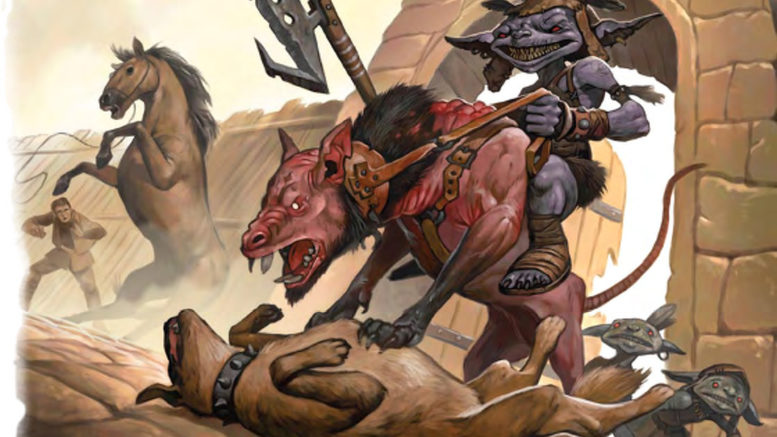It was the winter of my sophomore year of college when some friends suggested we try Dungeons & Dragons. Back then, I knew very little about the game—something about a group of people hunched over a table with tiny figurines and multisided dice, all following the commands of a designated leader. It seemed like something within my areas of interest, and with its resurfacing popularity in movies and TV, I decided to give it a go.
Turns out I wasn’t alone. As of 2007, over 6 million dedicated players participate in D&D gaming sessions in the U.S. alone with those numbers rising exponentially, making it the most popular tabletop role-playing game (TRPG) since its release more than 40 years ago.
Just as impressive is the expansive pop culture influence the game has had over the decades, spanning literature, music, film, television, video games and more, and inspiring entrepreneurs like the CEO of Kickstarter and writers like the creator of “Game of Thrones.”
So, with a brand new set of dice and a personally created character (a two-headed halfling named Skatz), I set off to explore the world of the game in my first-ever campaign. With the guidance of the Dungeon Master (the player in charge of creating the game’s story and relaying it to the other players), we supported each other in combat, collaborated in solving puzzles and relished in newfound treasures.
From tabletop to desk job
Six months and a few more campaigns later, I began my first office job.
Much like TRPGs, this was a new, immersive experience. Between constantly rushing to meetings and staying on top of overlapping deadlines, the job became a challenging quest of its own.
As a new member of this well-established workforce, there were times I lacked the confidence to speak up during pitching sessions, struggled to communicate with my team and failed to meet certain responsibilities. As more difficult tasks continued to rise, I began to close myself off from my peers and retreated to old work habits rather than embracing new ones. I was stuck without knowing how to move forward.
One Sunday night, at the end of my weekly Dungeons & Dragons session, the Dungeon Master was debriefing the other players and I on the events of the last few hours, sharing highlights, cracking jokes and complimenting some of the choices we made in the game. He shared his excitement about how our creativity and freedom in role-playing had really expanded since our first campaign and inclined us to push ourselves further, using the skills we had learned so far.
That’s when I realized: These were skills I had picked up during my new hobby and should be applying to my real-world job. In fact, that’s something any tabletop gamer could be doing. Researchers at the University of Montreal in Quebec have found that the things you learn during TRPG play don’t only benefit you on a campaign, but also in the workplace and everyday life.
Led by Stéphane Daniau, the researchers organized four groups of three to five people and examined the qualities the participants showcased throughout gaming sessions.
The findings suggest that playing TRPGs can enhance basic skills like writing, speaking and problem solving. Gameplay can improve small group skills, including communication and role assignment.
More importantly, the research concluded that engaging in these types of games can also stimulate a participant’s desire to discover, increasing their motivation to achieve their personal goals.
It was that sense of discovery that encouraged me to apply what I had learned playing D&D to the obstacles I was facing at work. Daniau calls this “transformative role-playing,” a process through which “players partly reveal themselves through their play… to allow (themselves) to explore their personal journey through an inter-subjective perspective.”
In order to reach this transformative level of gameplay, the researchers offered a set of immersive principles:
- Uncertainty – Accept an element of chance and adapt to different situations
- Rules – Respect the rules and improve them with the other players, enhancing collaboration and creativity
- Personal engagement – Become genuinely involved and encourage others to do the same, but don’t be too serious
- Realism – Develop both emotional distancing and empathy to increase personal motivation
Though originally intended for in-game participation, these principles can be applied to your job, as well as other situations that require you to take on an important role and collaborate with others.
While at work, for example, embracing rules and deadlines can lead to greater motivation and productivity, even in the face of stress. Focus on your small accomplishments and share them with others. Accept your mistakes and understand that sometimes things are out of your control. And lastly, strive for success and encourage your team to do the same, but make sure to find fun and excitement in the little things you do each day.
The best news is that it’s never too late to get started on a D&D quest. In fact, more than 60% of TRPG players are over the age of 18. So gather some friends, pick up some dice and game sets, and begin adventuring. There is much to discover—and much to learn on the way.
By Martin Blanco
Plucked from: http://listen.sdpb.org/post/how-playing-dungeons-dragons-can-help-you-irl

Be the first to comment on "How Playing Dungeons & Dragons Can Help You IRL"